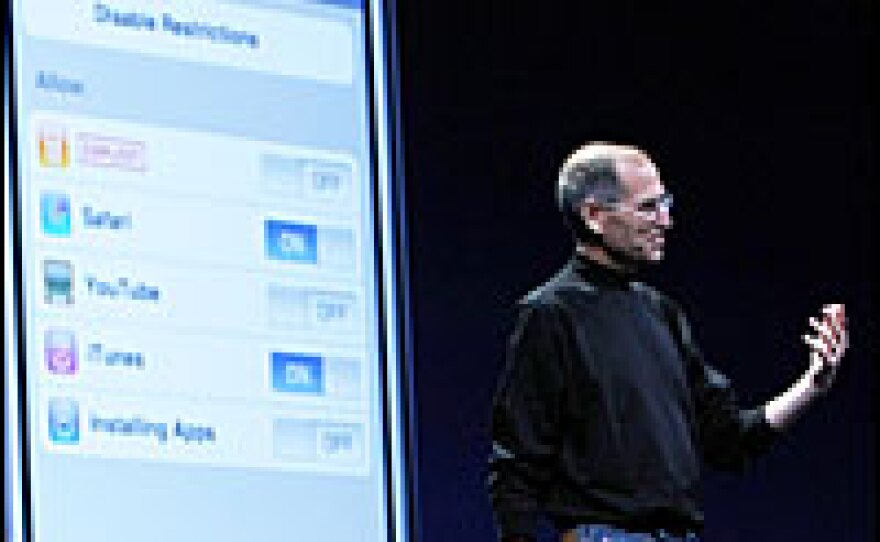
Apple Inc. CEO Steve Jobs announced on Monday that the company will begin selling a new version of its popular iPhone in mid-July with faster wireless Internet access and a slimmer price tag.
The new phone will be priced at $199 for an 8 gigabyte model, or $299 for a 16 gigabyte version available in either black or white — about $200 cheaper than current versions of those models.
It will also have features designed to appeal to both consumers and corporate users. These include multitasking capabilities, GPS and a new version of software that will allow the phone to sync with a corporate account. Users will also be able to purchase and download hundreds of third-party applications wirelessly.
The new phone is dubbed the iPhone 3G, a nod to the fact that it will run on a 3G, or third-generation, network. That will allow it to surf the Web at zippier speeds than the at-times snaillike pace that many saw as the original iPhone's chief flaw. The new phone will be able to gain Internet access via Wi-Fi, 3G and AT&T's Edge network and will automatically switch among these when it encounters a different wireless environment.
Users of the Apple's original iPhone will not be able to access the 3G network.
Jobs' announcement came at the company's annual worldwide developers' conference in San Francisco. Jobs said the new iPhone is "twice as fast at half the price" of the original iPhone, which went on sale a year ago.
Starting July 11, the iPhone will be available in 22 countries. Apple says it plans to extend that to 70 countries by year's end.
The new iPhone's features will include:
• Multitasking: While on a phone call, users will also be able to browse the Web, check e-mail or get map directions.
• GPS: New software updates will permit users of the iPhone 3G to find their location via satellite, get directions and monitor their location. The software updates will not enable the original iPhone to have these services.
• Third-party applications: Users will be able to purchase and download third-party applications wirelessly through an online "App Store."
• Corporate compatibility: The new software supports Microsoft Exchange ActiveSync, which allows business users to receive push e-mail, or real-time syncing of their e-mail. Calendar and contacts will sync in real time as well on the phone, which will also read PowerPoint files.
• Talk time: Apple says the new iPhone will have five hours of talk time on 3G networks and 10 hours on more widely available 2G networks.
AT&T's Wireless Plans and Networks
AT&T Wireless, which has an exclusive agreement with Apple to carry the iPhone in the U.S., said its plans for the iPhone 3G would start at $39.99 per month, in addition to a $30 fee for unlimited data access. The combined price represents a $10 increase from the plan the carrier unveiled for the original iPhone.
Verizon and Sprint have had a slight head start over AT&T in launching their 3G footprint, says Mike Greenawald, vice president of consumer experience for Nielsen Mobile, a wireless data research firm. T-Mobile recently also launched its first 3G network in New York City.
AT&T Wireless presently has a 3G network set up in 280 metro areas in the United States. The company plans to expand this network to 350 areas before the end of 2008, says spokesman Mark Siegel.
AT&T, however, has no plans to dismantle its slower Edge network, which the original iPhone uses to gain Web access. The Edge network has a larger coverage footprint than the 3G network, but Siegel declined to provide the number of markets in which it is available. Any 3G phones can access the Edge network if it is available in areas without 3G coverage.
At the end of the first quarter, 28 percent of U.S. subscribers were using 3G-ready handsets, according to Nielsen Mobile.
Wall Street Reaction
Following the new phone's announcement, Apple's stock price fell $4 on Monday, a 2.2 percent drop, closing at $181.61.
"You can now get a 3G handset for $199. Before, you had a less powerful machine for $399. I think they're clearly being aggressive to penetrate the market," says Rick Hanna, an equity analyst for Morningstar.
Hanna says the new iPhone's lower price, coupled with Apple's plans to distribute it in dozens of countries, could change the dynamics for the iconic tech company.
For now, the iPhone remains "just a sliver of their overall business," accounting for just 3 percent of Apple's revenue over the past 12 months, Hanna says. "But it certainly could grow to more than 20 percent of their consolidated sales." That could mean a market of $10 billion a year — the size of Apple's iPod business.
The Associated Press contributed to this report
Copyright 2022 NPR. To see more, visit https://www.npr.org. 9(MDAzMjM2NDYzMDEyMzc1Njk5NjAxNzY3OQ001))





